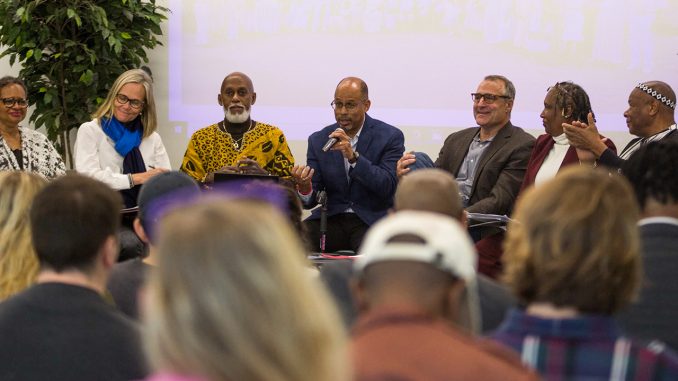
After the April 2018 incident where two Black men were arrested in a Rittenhouse Starbucks, a student in David Brown’s classroom said they didn’t understand what the ‘big deal’ about it was.
Brown, a public relations professor, said other students looked “ready to pounce.”
The situation made him realize he needed to learn how to navigate emotional conversations in the classroom.
“Sometimes it requires some courage to have these types of conversations,” Brown said. “But you’ve got to be equipped. That’s the key.”
In August 2018, Klein College received the Equity and Diversity Award from the Association for Education in Journalism and Mass Communication, an award recognizing measurable success in equity and diversity among faculty in journalism and communication programs.
“While [the award] was a great honor, it helped us recognize that we needed to put some structural things in place in order to really live in diversity,” Brown said. “What I’ve done, in terms of the position, is make diversity and inclusion more of a shared responsibility.”
Brown was appointed as the first diversity adviser to the Office of the Dean at Klein College of Media and Communication earlier this year. As a part of his new role to lead initiatives within the college, he created “Can We Really Talk,” a series of three seminars for faculty occurring throughout the fall. They are led in conjunction by Brown, the Center for the Advancement of Teaching and the Office of Institutional Diversity, Equity, Advocacy, and Leadership.
Deborah Cai, senior associate dean professor, said Brown has had tremendous influence in Philadelphia’s public relations and advertising.
“He’s really already engaged in so many ways in the city that as we looked at ‘what could we be doing next,’ that just seemed like a natural step to create this position,” she said.
“I know that talking about racism … [and] diversity and inclusion, I know that students want to do it but I think people are hesitant because they don’t know how to do it,” said Lauren Bullock, an assistant public relations professor, who attended series’ first session on Sept. 25. “A lot of the conversation was centered on how do we structure and set up our class so that people can be vulnerable and make mistakes and learn from those mistakes.”
The series will continue this month and in November, available to all professors, adjuncts and other interested faculty.
The October session will be led by Simuelle Myers, assistant director of CAT, and will focus on managing social media’s impact through class discussion.
In November, Valeria Dudley, IDEAL’s director of multicultural education and training, will talk about reacting to current events.
“When you’re thinking about students’ needs, they want to have these conversations, but they don’t want to offend somebody and they don’t want to create hostility,” Bullock said. “I feel like this is always an area of growth, no matter how much experience you have.”
Alex Hines, a junior communication and social influence major, said Temple needs more representation in its diversity needs.
“I’ve had like 15 professors so far, and literally only one has been Black. I don’t even see them walking around campus,” Hines said.
Samir Walker, a senior communication studies major, said he has seen diversity ignored at other schools he has gone to.
“Temple stands on diversity in itself and recognizes that we do have a diverse group, and I think the teachers reflect that,” Walker said.
Brown said he hopes to see his project grow further, and potentially be conducted yearly as a resource for faculty to take advantage of, and also see a similar resource offered to students.
“You’re not going to somehow become ‘woke’ in a 90-minute session,” he added. “It takes a lifetime, it takes some time. But you’ve got to get started somewhere.”


Fantastic article!